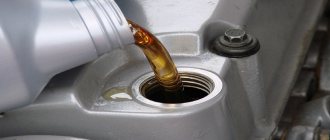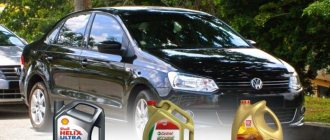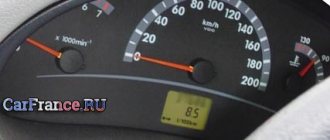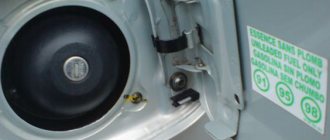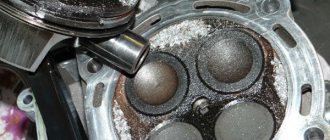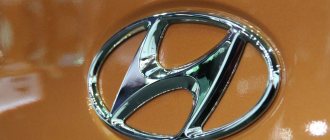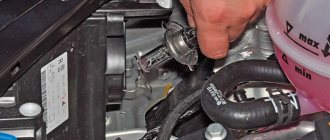Today, cars are very sensitive to the quality of gasoline, and in our time it leaves much to be desired. In this regard, most car owners try to refuel their car only at trusted gas stations that have a widespread network and are trusted. But, alas, even this cannot always guarantee you that after one such refueling you will not have to clean the entire fuel system. Therefore, if possible, it is always better to check the gasoline yourself before refueling. In this article we will tell you about what kind of gasoline the Volkswagen Polo sedan runs on.
What gasoline to fill in Volkswagen Polo sedan 2022 - we explain in detail
Volkswagen Polo Sedan White › Logbook › What kind of gasoline
flood?
I have one smart friend out of 100, so he says that it is necessary to fill
cars, what is indicated in the car book, especially when dealing with our low-quality fuel, in general it makes no sense to pour AI 92. There are also rumors that AI 95 is consumed less than AI 92!
They say that the difference in cost is justified for AI 95, because the consumption is less
. And do you fill it?
Is it worth saving on 95 gasoline by filling the tank with 92 - Volkswagen Polo Sedan Club
Who saves on gasoline? Someone who doesn't have the means to spend on it. Perhaps the owner has enough money for a new car and is simply doing whatever he wants.
However, most buyers love their vehicle and use the substances specified in the specifications.
The habit of saving on fuel comes from ancient times. Previously, the choice was small - the very affordable and suspicious 76 and 92. The latter was sold at a gas station. Here the savings were significant.
Many believed that the difference was essentially small, and were willing to take risks, knowing that the new car would be within their means. In fact, low octane 76 is a very low quality option, with a lot of additives, or just mostly water.
For a long time it was believed that we produced bad cars, or sold entirely fakes. Perhaps the reason for the frequent breakdowns was something completely different - the wrong gasoline.
Differences in gasoline
Currently, the difference in cost between the 92nd and 95th reaches about 3 rubles. As a result, the savings on one tank will not exceed 150 rubles. 1000 rubles is an achievement after 5 thousand kilometers.
And 10,000 rubles - after another 50 thousand kilometers. Usually during this time, owners become convinced that repairs are more expensive and do not justify the savings.
Let's define what the “wrong fuel” is. In fact, this is something that the manufacturer does not allow you to use.
You can obtain this data from the attached documentation. It indicates exactly what is needed - if AI-95, then 92nd gasoline will bring problems that will have to be solved.
- What can a risk taker expect?
- The car will seem to drive the same way.
- The engine can only be calibrated with a certain type of fuel.
- If something happens to the engine during the warranty period, the service center will first check your fuel. Accordingly, you have the right to refuse service if they find out that you do not follow the instructions.
gasoline 92 or | Volkswagen Polo sedan Volkswagen Polo sedan | VK
We need recommendations from real owners of this vehicle. I would also like an informed opinion, not just short answers. You can talk about an article or someone’s statements. Or, conversely, ask for advice on your problem. And perhaps clarify some nuances.
But if you consider yourself a competent person in this topic, then you can answer the already published question.
I was driving around the city, and then such an incident happened: I was running out of gas and I forgot where the nearest gas station was, and I realized how little gasoline a Volkswagen consumes, that you don’t even remember where you refueled. The result is the same. At least I didn't see any significant differences. But the idea is to go to the stand and check the difference on the computer. It’s a pity that she was too busy, I would have met her that way. The Germans are not fools, they know what they are saying.
I sold a Japanese car, a Toyota, and bought a German car. Of course, you don’t mind anything for your swallow, but it seems to me that you also need to think about your pocket. I checked it myself, I know what I’m saying. The manufacturer recommends filling it with gasoline. They won’t say it in vain. I also heard that if you fill with gasoline with a lower octane number than the manufacturer recommends, the faster the engine parts wear out. Really economical car, buy it.
But then the truck driver pulled me to the gas station. I'm a girl and I'm very bad at this; I recently purchased a Volksvagen Polo. It seems to me that the manufacturer knows what he is saying, especially the German one, I have no choice but to take their word for it. And I’m not going to fill in any other type.
In Russia, they don’t even know that it’s better to pour gasoline into a German car. I doubt that it is adapted to our conditions. Here AvtoVAZ, this is for us, does not accept good gasoline. The traction disappeared and the consumption only increased. Be careful at village gas stations, my car is now in its second month of treatment after traveling. Be careful at gas stations. It is inexpensive and the consumption is moderate. But at best, the fuel system.
Come on guys, what kind of gasoline, take a diesel kopeck piece, I got it in the summer of that year, I love it, it hums pleasantly, the appetite is moderate, and what a craving. So stop thinking about gasoline. As they say, anyone who tries diesel will not pay for gasoline. Hello motorists, I’m going to buy a Volkswagen Polo, but I have no idea what kind of gasoline it will perform better on, please advise. You can’t jump higher than your head and no matter how hard you try, the polo just physically won’t be able to go faster...
It’s better to read the information about the engine, and not the numbers on the gas flap, the main thing is to use proven and reliable gas stations Guys! I'm happy for all of you, most of you are apparently happy with your Marco...! What gasoline to fill a Volkswagen Polo with. What is the best gasoline to put in a Volkswagen Polo?
Pay attention to these articles:. What gasoline to fill the Lada Priora with. Opel Vivaro Opel Vivaro. Opel Vectra Opel Vectra. Click to cancel reply. Methods for heating diesel fuel. What to choose - diesel or gasoline? READ ALL USEFUL TIPS. FIND AN ANSWER TO ANY QUESTION OR ASK YOUR OWN.
Reasons for the discrepancy between real fuel consumption and the official one
The above are the figures declared by the manufacturer, it’s worth focusing on them, but not all owners will be able to achieve such indicators. The thing is that the automaker, in order to calculate the average consumption, creates or selects “greenhouse” and favorable conditions and time for test runs. Weather conditions (temperature, humidity, wind and even atmospheric pressure), routes (lack of traffic jams and traffic density), the condition of the road surface along the entire length, the number of traffic lights and much more are taken into account.
But the main measurements are carried out on a test track, which has little in common with real driving conditions. Professional drivers, by pedaling in a special way, can both increase and significantly reduce performance. In general, everything is not in favor of car owners, but for the sake of marketing and advertising, so the actual cost may be slightly higher.
Volkswagen Polo Sedan 2012, 105 l. With. - gas station
Worked for 12 years at VW Read what to put on the gas tank hatch. From experience, absolutely 95 After /98 Related to the pistons. Even if you decide on the same motor. There was even a promotion - the car was at fault and until the age of 14, the piston was changed. However, VW did not shout or write about this. If you have a car under 14 years old, have it checked by an official using the VIN! I don’t rule out that they will still of course change it – Free of charge! (you pay for the work).
Two different cars, one engine! One book has 92 in the book, the other has 98. what the hell?
Naturally, I have no idea what the prices are in Tyumen, and do you have Taxi-Oil?
not men, as far as I know, we don’t have such taxi-oil gas stations :)
I've been doing this for years and the level has never dropped below half a tank, but 4 months ago, after a trip to the countryside, I arrived on a light bulb with an almost dry tank. I think let me fill it with 98, you can say whatever you want, alas, the difference is tangible, the advantages of AI-98 have already been described to our client, so there is no point in repeating. That all additional parts are removed from the door once 95 Apollo does not have a drop in the tank!
What kind of gasoline to fill in a Volkswagen Polo sedan
and there is no point in arguing, 98 is better in a tangible way, and it is many times more expensive :)
On Lukoil 95 ecto - 34.35, on Gazprom GDrive 34.35, and on TAXIoil 98 - 34.10 rubles, gasoline
good, how does it make such a difference to you, Tangibly?!
95 Fortis on Stat Oil)
Our client can only see that, alas, gas stations say AI-95, some say A-95 or A-92. Well, AI is the testimony of the research method, but A.95 it can no longer be because it constitutes a mechanical method and no one writes it or does it. A-95 is approximately AI-105 and such a situation is already overwhelming, either stupid ignorance or scam. Not long ago we checked the hourly gas station (some kind of sharashka on the edge of the town) and the actane numbers were spreading out to something like 92, the actane number was 92.8 and it felt like it was being roughly diluted.
Reasoning about why I only fill Volkswagen Polo Sedan with AI-95 gasoline
Overall dimensions of Volkswagen Polo sedan
Hello to all car enthusiasts and Volkswagen Polo owners!
So, all the necessary information on the brand of gasoline is contained on the lid of the car’s gas tank flap.
For refueling, it is recommended to use the AI-95 grade of gasoline, but at the same time, the use of AI-92 is allowed. However, I never use 92-grade gasoline for refueling and I will try to argue for this now.
I am not a mechanic, but I remember the following for myself: at the moment when the piston in the cylinder reaches the highest point of its position, the spark plug ignites the air-fuel mixture and the released energy pushes the piston down. However, a phenomenon called detonation often occurs. In simple terms, this is the fact of ignition of the air-fuel mixture at a moment when the piston is not yet in the optimal extreme upper position in the cylinder, but, for example, is just rushing to this extreme upper point of its position. The numbers 92, 95, 98 or 100 are the octane number of gasoline. The octane number of gasoline is a characteristic of the knock resistance of gasoline. The higher the octane number of gasoline, the higher the compression ratio in the engine cylinder it can withstand without spontaneous ignition (in other words, detonation). It is for this reason that turbocharged engines are more demanding on the grade of gasoline and, as a rule, it is recommended to fill them with AI-98 gasoline.
If we really exaggerate, then the 95th burns slower than the 92nd. Unfortunately, there are no obvious factors that can provoke detonation phenomena in the engine that would be present in the singular, and this is always a whole set of reasons. The weather was very hot and we pressed the gas pedal too hard - detonation. Due to the peculiarities of operation, the composition of the air-fuel mixture became different from what was taken into account when designing the engine at the factory - detonation, etc. Therefore, using 95 gasoline, and 92 gasoline, I reduce the likelihood of detonation.
The cost of AI-95-K5 gasoline is 43 rubles 35 kopecks per liter. While AI-92 gasoline costs 40 rubles 85 kopecks. Thus, if you fill a full tank of a Volkswagen Polo Sedan with AI-95 gasoline (its volume is 55 liters), then the amount of the check will be 2 thousand 384 rubles 25 kopecks. When using AI-92 gasoline, a full tank will cost the car owner 2 thousand 246 rubles 75 kopecks. Thus, from each tank the savings when using the 92nd instead of the 95th will be 137 rubles 50 kopecks
. Well, I don’t even know... If you use a Volkswagen Polo as a taxi and you need to refuel this full tank every few days, then probably some savings will be observed, and for the average car owner who does not work in a taxi, the benefits There is no benefit from using 92 gasoline instead of 95. Moreover, there is one more nuance here - these calculations were made on the assumption that the fuel consumption in an engine using 92-octane gasoline will be exactly the same as for 95-octane gasoline. Which, by the way, I strongly doubt and it seems to me that fuel consumption will be higher with 92 gasoline.
But there is another extreme, which I also do not support - pouring high-octane 98 or 100 gasoline into an atmospheric engine. The problem is that additives such as acetone and various benzene compounds can be used to increase the octane number. And a mixture of acetone and gasoline perfectly corrodes various rubber seals in the engine. And, since it is unlikely that anyone makes an independent examination of the quality of gasoline at every refueling, pouring high-octane gasoline into a conventional naturally aspirated engine is a sure way to end its operating cycle much earlier.
As for me, every sixth gas station I fill up with 95 G-Drive gasoline and after winter I add a fuel additive.
Question from the audience - if you have a Polo and you use 92 gasoline on it, what consumption do you record? I will be grateful for your answer!
My other articles associated with this topic
Source
gasoline | Topic started by: Matheus
who pours what kind of gasoline? and why
Max (Grzegorz) 92 never, Polo rides on it like a horse-drawn cart! I agree, the car is very sensitive to gasoline!
Vitaly (Gwenfor) only ecto, at 92 the engine jerks, but I heard about the 98 that the pistons can burn out
Svetlana (Mainaka) I’ve been filling it with 92 since the first day... nothing twitches)
Max (Grzegorz) Svetlana, doesn’t twitch and doesn’t move! :))
Sergey (Aseem) Max, It may not work with an automatic transmission, but I didn’t feel much difference with a manual transmission.
After 5000 km, I began to feed 92 ectos. I picked up the car on June 4th, it will soon be 7000 km.
Svetlana (Mainaka) Max, Ha ha ha, just Petrosyan))) she’s still going, I’d say she’s even flying...
Svetlana (Mainaka) Sergey, Not far from you)) I took the car in early May, almost 10 miles already))
Alexander (Kanva) Sergey, a catalyst is an expensive thing, is it worth saving on low-octane fuel...
Nastya (Ludovic) OD manager said that it is possible to pour 92... so from the date of purchase only 92.. and everything is fine..
Sergey (Aseem) Alexander, The specifications for the Foltz say AI95, min 92…………
Sergey (Aseem) Svetlana, right! A car for driving, not gathering dust in the garage.
Svetlana (Mainaka) Sergey, I agree))
Alexander (Kanva) Sergey, everyone’s writing is different. I personally have 9829 firmware 98/95. Depends on the engine ECU firmware. On 9970 sticker 95/92 is attached.
Artem (Winfred) bought 92 second hand. On the gas tank cap it says 95-98. I pour 95. For the money it seems to be the same
Sergey (Aseem) Alexander, I’m just 95 - 92. Sorry if something’s wrong…………
Max (Grzegorz) If you don’t feel the difference, I’m ready to take a straight line, you pour 92 with me, I pour 95/98 with you, but all this should have some kind of prize! :-))
Ilya (Zuleika) I have .8/100 km, and 95-6.8/100 km, it’s cheaper for me to drive 95
Alexey (Doran) since November 2012 only on 92, everything is fine, the officials say that with 95 there are more calls for service than with 92, if only there was a real 95, I fill up at Rosneft, consumption in the city is 9 liters, with climate control on the machine, the dynamics are ok.
About our Polo GT from drive.ru Russian dealers will have a new, most powerful, daring... version of the Volkswagen Polo sedan. It is equipped with a 1.4 petrol turbo-four with a power of 125 hp. and can be equipped with a seven-speed DSG robot or a six-speed manual transmission. The car is decorated in a sporty style both outside and inside. In general, the Polo GT is the boldest step in the history of a budget model.
Modification with a 1.4 l engine
An engine capacity of 1.4 liters is considered optimal for this model. All internal combustion engines, be it gasoline or diesel, cope perfectly with the tasks assigned to them in terms of comfort and traction load, without increasing fuel consumption. This is largely due to attachments, fuel injection and supply systems, and new technologies in engine control.
Article on the topic: What is the bolt pattern on the Volkswagen Passat B5
Petrol 1.4 TSI, 2022 – present. time, (125 hp) with turbocharging, official fuel consumption (AI-95):
- mixed cycle (automatic manual) - 5.7 liters;
- in the city (mechanics) – 7.5l;
- in the city (automatic) – 7.3l;
- highway (mechanics) – 4.7l;
- highway (automatic) – 4.8l;
Petrol 1.4 TSI, 2009-2014, (85 hp) naturally aspirated (AI-95):
- mixed cycle (automatic manual) - 6.15.9;
- urban cycle (automatic manual) - 8.27.9;
- highway (automatic manual) - 4.94.8;
Petrol 1.4 TSI GTI, 2009-2014, (180 hp) with turbocharging (AI-95):
- combined cycle (DSG) - 5.9;
- urban cycle (DSG) - 7.5;
- track (DSG) - 5.1;
Petrol 1.4 FSI, 2001-2005, (86 hp) non-turbocharged (AI-95):
- mixed cycle (mechanics) - 5.8;
- urban cycle (mechanics) - 7.7;
- track (mechanics) - 4.7;
Diesel 1.4 TDI, 2005-2009, (70 hp), turbocharged:
- mixed cycle (mechanics) - 4.5;
- urban cycle (mechanics) - 5.7;
- track (mechanics) - 3.9;
What gasoline to fill a Volkswagen Polo with?
What is the best gasoline to put in a Volkswagen Polo?
We need recommendations from real owners of this vehicle. I would also like an informed opinion, not just short answers.
News on the website:
Similar news:
I was driving around the city, and then such an incident happened: I was running out of gas and I forgot where the nearest gas station was, and I realized how little gasoline a Volkswagen consumes, that you don’t even remember where you refueled. But then I remembered where to go and finally fed my horse 95.
Well, what can I say, 95 or 98, no matter what you put in the tank. The result is the same. At least I didn't see any significant differences. But the idea is to go to the stand and check the difference on the computer.
I really like to put pressure on my slippers, so I fill it with 98. My car just takes off with this gasoline :) Yes, the manufacturer advises filling it at no lower than 95. I think I'm doing the right thing, filling it with 98.
Today I came to the gas station, I think I’ll fill up a full tank of 98, and I don’t regret it, there was such a girl there who filled everything up. It’s a pity that she was too busy, I would have met her that way.
The gas station is right next to my house, I also fill up with a card discount, so I fill up with 98, I can afford it, and the car behaves just fine with that kind of gasoline.
I bought a polo half a year ago, for the home-to-work route, I need a little gasoline, I use 92nd and it performs fine, I don’t know that everyone doesn’t like this kind of gasoline.
I think it’s possible to use 92, I have a friend who drives 92 and in winter it just has trouble starting, but he says he’s quite happy with it. But it seems to me that it is best to fill it with 95. The Germans are not fools, they know what they are saying.
I fill my Volks with 92-grade gasoline, and whenever possible I fill up at the same gas station every time. I don’t see the point in pouring 95. It costs more, and I didn’t notice a noticeable difference when I tried to fill in the 95th. In general, I have and will only fill in the 92nd. I don’t want to senselessly spend extra money on fuel if there is no difference.
I sold a Japanese car, a Toyota, and bought a German car. I regret it, I want to return my beauty, she was more economical and calmly used the 92nd, unlike the Volkswagen Polo, which only consumes the 95th.
Yes, everyone says differently, but I looked at the statistics, most Volkswagen Polo owners fill up with the 95th, because that’s what the manufacturer recommends. They also ride the 92nd, but many fewer people. And on the 98th there is even less, well, this is probably because it is an order of magnitude more expensive, but the quality is the same as the 95th. There are just people who don’t know about it and think that 98 is the best. Of course, you don’t mind anything for your swallow, but it seems to me that you also need to think about your pocket. Personally, I stick to the majority and go to AI95.
Don’t even think about filling your swallow with AI92! I fill it with 95, and in terms of money the difference is not big at all, on the 95 the engine sucks less than on the 92, and the car behaves faster. I checked it myself, I know what I’m saying. My choice is 95 and I advise you.
Well, I fill my Polo with 95. The manufacturer recommends filling it with gasoline. They won’t say it in vain. I also heard that if you fill with gasoline with a lower octane number than the manufacturer recommends, the faster the engine parts wear out.
Really economical car, buy it. I drove 600 km on 98 gasoline on a full tank, and without stopping. But then the truck driver pulled me to the gas station.
I'm a girl and I'm very bad at this; I recently purchased a Volksvagen Polo. And I fill up with 98 because it says so in the documents, and it also says so on the tank cap. It seems to me that the manufacturer knows what he is saying, especially the German one, I have no choice but to take their word for it.
I've been driving the 95 for two years now and have no problems. And I’m not going to fill in any other type. Although there is a desire to experiment with 98.
In Russia, they don’t even know that it’s better to pour gasoline into a German car. I doubt that it is adapted to our conditions. Here AvtoVAZ, this is for us, does not accept good gasoline.
I bought a Volkswagen Polo from the showroom, drove 92 and filled it up, and the engine knocked, apparently I had to fill it with 95 and higher, now they are changing the engine under warranty.
I drove the 95th and decided to switch to the 92nd, I regretted it. The traction disappeared and the consumption only increased. So it’s more profitable to drive the 95, even though it’s a little more expensive.
Be careful at village gas stations, my car is now in its second month of treatment after traveling. Now I’ll take gasoline with me in a canister, but the car ran well at 98, I can afford that kind of gasoline.
So a polo came to my service center, he said he filled it with 95, and the spark plugs were all covered in soot, apparently they got burnt gasoline with all sorts of low-quality additives. Be careful at gas stations. In general, for polo I recommend the 95 as a specialist. It is inexpensive and the consumption is moderate.
My father and I went to a neighboring city, before the trip we filled the tank of the 95 with a full tank, our Volz drove like never before, so the same way I filled up the 95 will continue. I don’t even think about 92 even though it’s cheaper.
I read about my car, they say it’s 95, so I fill it up, I’m afraid the octane is lower, it’s still expensive to change the engine. But at best, the fuel system.
I’m not a motorist myself, but I’ve heard that the 98 is needed. Because when you ride at 95, the power decreases. And I’m afraid to even talk about the 92nd, there is immediate resuscitation for the engine.
Come on guys, what kind of gasoline, take a diesel kopeck piece, I got it in the summer of that year, I love it, it hums pleasantly, the appetite is moderate, and what a craving. The engine is just fire. So stop thinking about gasoline. As they say, anyone who tries diesel will not pay for gasoline.
Hello motorists, I’m going to buy a Volkswagen Polo, but I have no idea what kind of gasoline it will perform better on, please advise. They say that 92 does not disdain. But I'm afraid.
What a 98. Wake up... and stop entertaining yourself with illusions, supposedly the 98 goes better. You can’t jump higher than your head and no matter how hard you try, the polo just physically won’t be able to go faster... bullshit. I've owned the car for a year, I've been using it for 92, everything is fine. It’s better to read the information about the engine, not the numbers on the gas flap, the main thing is to use proven and reliable gas stations
Guys! I'm happy for all of you, most of you are apparently happy with your Marco. I recently purchased a Polo from the Spaniard AT, almost new 10, etc., I still don’t fit one thing in my puzzle - WHY? in mine, and in any other configuration. without pre-ordering the required configuration from a dealer, THERE IS NO REVIEW OF fuel consumption per 100 km and range? The Krauts probably drank too much. I often drive on the M4 front-rear. and my sk 150-170 av/nv S at 100. This bug is silent about my fate at the nearest gop stop)) after the previous X5 3.0 it doesn’t eat, of course, and doesn’t eat And it imitates the smell of a scorched clutch)
95 definitely, even though it has a catalyst on additives and you can break through in 100 thousand. 92 = detonation is common, but for an engine it’s worse when the piston skirt hits the cylinder, there were cases from detonation of the piston, detonation finally fell apart - it’s not like “fingers ringing” for you, like in the village namely the transverse impact of the piston in the cylinder. 95! or look without detonation
Volkswagen Polo engines
Generation 2 (1981-1990)
- gasoline, 0.9, 39 horsepower, front-wheel drive, manual
- gasoline, 1.0, 40 hp
- gasoline, 1.0, 45 horsepower, 20.3 seconds to 100 km/h, 7.2/5 liters per 100 km
- gasoline, 1.3, 55 horsepower, 15.5 seconds to 100 km/h, 8/5.1 liters per 100 km
- gasoline, 1.3, 60 horsepower
- gasoline, 1.3, 75 horsepower, 11.9 seconds to 100 km/h, 8.2/5.4 liters per 100 km
Generation 2 Restyling (1990-1994)
- gasoline, 1.0, 45 horsepower, 20.5 seconds up to 100 km/h
- gasoline, 1.3, 55 horsepower, 15.5 seconds to 100 km/h
- gasoline, 1.3, 75 horsepower, 12.1 seconds to 100 km/h
- diesel, 1.4, 48 horsepower, 19.5 seconds to 100 km/h
Generation 3 (1994-2001)
- gasoline, 1.0, 50 horsepower, 18.5 seconds to 100 km/h, 7.7/4.9 liters per 100 km
- gasoline, 1.0, 45 horsepower, 21.4 seconds to 100 km/h
- petrol, 1.3, 55 hp, 16.3 sec to 100 km/h petrol, 1.4, 60 hp, 14.9 sec to 100 km/h
- gasoline, 1.4, 100 horsepower, 10.5 seconds to 100 km/h, 9.6/5.4 liters per 100 km
- gasoline, 1.6, 75 horsepower, 12.2 seconds to 100 km/h
- diesel, 1.7, 57 horsepower, 17.4 seconds to 100 km/h, 5.9/3.6 liters per 100 km
- diesel, 1.7, 60 horsepower, 17.4 seconds to 100 km/h, 5.9/3.6 liters per 100 km
- diesel, 1.9, 64 horsepower, 15.8 seconds to 100 km/h, 7.7/4.4 liters per 100 km
Generation 3 Restyling (1999-2001)
- gasoline, 1.0, 50 horsepower, 18.5 seconds to 100 km/h, 7.7/4.9 liters per 100 km
- gasoline, 1.2, 54 horsepower, 16.3 seconds to 100 km/h
- gasoline, 1.4, 54 horsepower, 14.9 seconds to 100 km/h
- gasoline, 1.4, 60 horsepower, 14.9 seconds to 100 km/h, 8.5/5 liters per 100 km
- gasoline, 1.4, 75 horsepower, 12.3 seconds to 100 km/h, 8.6/4.8 liters per 100 km
- gasoline, 1.4, 100 horsepower, 10.5 seconds to 100 km/h, 9.6/5.4 liters per 100 km
- diesel, 1.4, 75 horsepower, 17.4 seconds to 100 km/h, 5.9/3.6 liters per 100 km
- diesel, 1.4, 90 horsepower, 17.4 seconds to 100 km/h, 5.9/3.6 liters per 100 km
- diesel, 1.7, 60 horsepower, 17.4 seconds to 100 km/h, 5.9/3.6 liters per 100 km
- diesel, 1.9, 64 horsepower, 15.8 seconds to 100 km/h, 7.7/4.4 liters per 100 km
Generation 4 (2001-2005)
- gasoline, 1.2, 54 horsepower, 17.5 seconds to 100 km/h, 7.7/4.7 liters per 100 km
- gasoline, 1.2 64 horsepower, 14.9 seconds to 100 km/h, 7.6/5.1 liters per 100 km
- gasoline, 1.4, 75 horsepower, 12.9 seconds to 100 km/h, 8.8/5.2 liters per 100 km
- gasoline, 1.4, 86 horsepower, 12.1 seconds to 100 km/h, 7.7/4.7 liters per 100 km
- diesel, 1.4, 75 horsepower, 13.6 seconds to 100 km/h, 5.5/3.9 liters per 100 km
Generation 4 Restyling (2005-2009)
- gasoline, 1.2, 55 horsepower, 17.5 seconds to 100 km/h, 7.8/4.9 liters per 100 km
- gasoline, 1.2, 64 horsepower, 14.9 seconds to 100 km/h, 7.7/5.1 liters per 100 km
- gasoline, 1.4, 80 horsepower, 13 seconds to 100 km/h, 9/5.3 liters per 100 km (with automatic)
- gasoline, 1.6, 105 horsepower, 11.3 seconds to 100 km/h, 10/5.9 liters per 100 km (with automatic)
Fifth generation (2009-2015)
- gasoline, 1.2, 105 horsepower, 9.7 seconds to 100 km/h (robot), consumption 7/4.4 liters (with robot) per 100 km
- gasoline, 1.4, 85 horsepower, 11.9 seconds to 100 km/h (with manual transmission) and 11.9 seconds to 100 km/hour (with robot), consumption 8/4.7 (with manual transmission) and 7, 7/4.7 liters per 100 km (with robot)
- gasoline, 1.2, 60 horsepower, 16.1 seconds to 100 km/h (manual transmission), 7.3/4.5 liters per 100 km
- gasoline, 1.2, 70 horsepower, 14.1 seconds to 100 km/h (manual transmission), 7.3/4.5 liters per 100 km
- gasoline, 1.2, 85 horsepower, 11.9 seconds to 100 km/h (manual transmission), 8./4.7 liters per 100 km
- gasoline, 1.6, 85 horsepower, 11.9 seconds to 100 km/h, 8.7/5.1 liters per 100 km
- gasoline, 1.6, 105 horsepower, 10.5 seconds to 100 km/h (manual gearbox)
Generation 5 Restyling 1 (2014)
- gasoline, 1.0, 60 horsepower, 15.5 seconds to 100 km/h, 6.4/4.2 liters per 100 km
- gasoline, 1.0, 75 horsepower, 9.5 seconds to 100 km/h, 6.4/4.4 liters per 100 km
- gasoline, 1.0, 95 horsepower, 10.5 seconds to 100 km/h, 5/3.6 liters per 100 km
- gasoline, 1.0, 110 horsepower, 9.3 seconds to 100 km/h, 5.2/3.8 liters per 100 km
- gasoline, 1.2, 90 horsepower, 10.8 seconds to 100 km/h, 5.8/4.1 liters per 100 km
- gasoline, 1.2, 110 horsepower, 9.3 seconds to 100 km/h, 6.1/4 liters per 100 km
- gasoline, 1.4, 150 horsepower, 7.8 seconds to 100 km/h, 5.8/4.1 liters per 100 km
- diesel, 1.4, 90 horsepower, 10.9 seconds to 100 km/h, 3.9/3.3 liters per 100 km
- diesel, 1.4, 105 horsepower, 9.9 seconds to 100 km/h, 3.9/3.2 liters per 100 km
- gasoline, 1.4, 125 horsepower
Generation 5 Restyling 2 (2015)
- gasoline, 1.6, 90 horsepower, 11.2 seconds to 100 km/h, 7.7/4.5 liters per 100 km
- gasoline, 1.6, 110 horsepower, 10.4 seconds to 100 km/h, 7.8/4.6 liters per 100 km
- gasoline, 1.4, 125 horsepower, 9 seconds to 100 km/h, 7.3 4.8 liters per 100 km.
Volkswagen Polo, what gasoline should I fill in, 92 or 95?
Today, cars are very sensitive to the quality of gasoline, and in our time it leaves much to be desired. In this regard, most car owners try to refuel their car only at trusted gas stations that have a widespread network and are trusted. But, alas, even this cannot always guarantee you that after one such refueling you will not have to clean the entire fuel system. Therefore, if possible, it is always better to check the gasoline yourself before refueling. In this article we will tell you about what kind of gasoline the Volkswagen Polo sedan runs on.
Fuel tank volume
The gas tank installed on the Volkswagen Polo allows you to travel from 600 to 850 kilometers without the need to refill the fuel tank. All this is possible thanks to its volume from 42 to 55 liters.
Cars currently coming off the production line are equipped with two types of gas tanks, depending on the body type:
- The sedan is equipped with a 55-liter fuel tank;
- The hatchback is equipped with a 45-liter gas tank.
It is recommended to add fuel without waiting for it to reach the lower mark. This is due to the fact that the gas pump is more loaded when there is less than 25% of the maximum fuel volume in the tank. Also, low gasoline levels create a risk of debris from the bottom of the fuel tank being drawn into the filter.
Article on the topic: How to change the front pads on a Volkswagen passat b5
AI-92 and AI-95: what is the difference?
Before moving on to the “numbers” of gasoline brands, let’s briefly understand why different grades exist in the first place, and define a couple of key concepts.
The basic principle of operation of the engine is simple: gasoline and air are supplied to the cylinder, the piston moves up, approximately at the moment it reaches the top point, the spark plug ignites the fuel mixture, and the burning fuel pushes the piston down. In this process, it is important that the fuel begins to burn on time - when the spark plug ignites it. If the fuel ignites spontaneously ahead of time, when the piston is still moving up, this harms the engine, destroying it. Therefore, one of the characteristics of any gasoline is detonation resistance , that is, its ability to resist spontaneous ignition. And this detonation resistance depends on the octane number of gasoline, which is indicated in its labeling: for example, AI-95 has an octane number of 95.
Thinking that “95 gasoline is better than 92” is as logical as thinking that “absinthe is better than vodka, because it contains 70 degrees versus 40.” The quality of gasoline is not determined : the content of sulfur, manganese, resins and other impurities is established not by the brand of gasoline, but by technical regulations. So you shouldn’t assume that “95 gasoline is cleaner and better quality than 92”: the quality of both meets modern fuel requirements and complies with current Euro standards.
Another misconception related to gasoline is the idea that the higher the octane number, the healthier the gasoline is for the car. There is a grain of truth in it, but in general the habit of some owners of old cars to “pamper them after payday”, pouring AI-98, makes no sense .
But for engines with a high compression ratio or those equipped with a turbine, the logic “the higher the octane number, the better” is fully justified : both the compression ratio and the amount of air supplied to the cylinders are sufficient for optimal combustion of high-octane gasoline, and the increase in detonation resistance only goes to benefit. At the same time, a decrease in octane number, on the contrary, negatively affects the operation of the engine and its service life: the likelihood of detonation increases, which gradually destroys the engine.
Description of the reasons for high fuel consumption and their solutions
If fuel consumption increases after refueling at a gas station, the reason for this is low quality fuel. To eliminate this situation, it is necessary to drain the gasoline from the gas tank and, if possible, flush the fuel line. The filter also needs to be changed. Prolonged operation of the vehicle on low-quality gasoline is not recommended, as excessive wear of the power plant and related systems is possible.
Another reason for increased fuel consumption may be damage to the fuel system. The most common problem is the gas tank. Damage may occur as a result of hitting an uneven road surface or jumping over a curb. To eliminate the malfunction, it is necessary to inspect the elements of the fuel system by descending under the bottom of the car. If damage is detected, it must be repaired. Operating a vehicle with leaking fuel is prohibited, as there is a risk of fire.
Article on the topic: How to change the front pads on a Volkswagen passat b5
Incorrect tire pressure leads to increased rolling resistance. For this reason, the driver has to press the gas pedal harder to the floor to maintain speed. You can identify deviations in tire pressure by visually inspecting the condition of the tread or using a pressure gauge. The problem can be resolved by inflating the wheels to the required pressure.
Styling and tuning if done incorrectly also cause increased gas mileage. Many elements intended for external modification of a car do not pass wind tunnel tests. As a result, air resistance to movement increases and it is more difficult for the car to maintain a given speed. To eliminate increased gasoline consumption, it is necessary to remove all incorrectly installed tuning elements. In case of modernization of the power plant, it is also possible to increase the volume of fuel consumption. To eliminate it, it is necessary to dismantle the stock elements.
The vehicle's roll and the condition of the suspension affect fuel consumption. If the driver notices that the free run of the car has become smaller, it is recommended to visit a service station and check the car for wheel alignment. In case of deviation from the norm, it is necessary to adjust the parameters.
Engine breakdowns or general excessive wear lead to suboptimal fuel combustion, which results in increased fuel consumption. To eliminate this phenomenon, it is necessary to replace worn parts with new ones. In some cases, a major overhaul of the power plant may be required.
The amount of fuel consumed directly depends on compliance with maintenance intervals. Contaminated air or oil filters affect the operation of the power unit. The drop in its power is accompanied by an increase in the volume of fuel consumed. To eliminate the resulting increased fuel consumption, it is necessary to carry out maintenance, observing the deadlines specified by the manufacturer.
Article on the topic: How to change the oil of a Volkswagen Touran
Is it possible to fill a Volkswagen Polo with 92 gasoline?
The psychologically important fuel consumption mark is 10 liters per hundred. If the consumption is less than ten liters, then this is considered good, but if it is higher, then it requires explanation. In the last few years, fuel consumption of about 6 liters per 100 km has been considered optimal in terms of economy.
Volkswagen Polo is available with the following types of fuel: Gasoline AI-95, Diesel fuel, Gasoline AI-92, Gasoline AI-98, Gasoline AI-91.
Volkswagen Polo fuel consumption ranges from 4.4 to 10 liters per 100 km.
What kind of gasoline should I fill Volkswagen Polo with ? The manufacturer recommends using 98 or 95 gasoline. According to experts, when using 95 gasoline, fuel consumption increases slightly and power decreases slightly.
In addition, in 2011 fuel requirements for the VW Polo Sedan were relaxed. at least 91 is permitted .
If you find an error, please select a piece of text and press Ctrl+Enter.
Fuel consumption of Volkswagen Polo with different engine sizes
The Volkswagen Polo is equipped with power plants of various sizes and automatic, manual and robotic gearboxes.
Depending on this, the fuel consumption of a car per 100 km varies. The most popular Volkswagen Polo models with 1.2, 1.4 and 1.6 liter engines are shown in the table below.
Volkswagen Polo Sedan 2012, 105 l. With. - gas station
Cars for sale
Volkswagen Polo, 2016
Volkswagen Polo, 2014
Volkswagen Polo, 2019
Volkswagen Polo, 2020
About our Polo GT from | Topic author: Igor
About our Polo GT from drive.ru Russian dealers will have a new, most powerful, daring... version of the Volkswagen Polo sedan. It is equipped with a 1.4 petrol turbo-four with a power of 125 hp. and can be equipped with a seven-speed DSG robot or a six-speed manual transmission. The car is decorated in a sporty style both outside and inside. In general, the Polo GT is the boldest step in the history of a budget model. https://okl.lt/4CJcH
Alena Reba! What is it!? I have a new Polo 105hp. Mileage 29 thousand! Already under warranty I changed both airbags! Signed up for the creaking of the window regulator and steering wheel! Now the pump is leaking. The car is operated on the highway 90 percent! .
20 Oct 2016 11:39
Hello. We are very sorry that you encountered such problems while operating our car. But we would like to note that it is precisely for such cases that there is a guarantee. You need to contact our official dealer to carry out diagnostics and determine the causes of the malfunction.
20 Oct 2016 12:09
Hello. I won’t get along with OD)
92nd or 95th? — Volkswagen Polo Sedan logbook “Al.
Volkswagen Polo Sedan owner's story - refueling. Among Polo owners there are those who run the car despite the recommendations of the 92nd factory.
Volkswagen Polo 2012, 1.6l., So I decided to write about again.
Apr 3 2012 – Review from the owner of Volkswagen Polo 2012. . consumption in the text, Kemerovo region, 105 hp, 1.6 liters, Sedan body type, gasoline, manual transmission.
Which spark plugs are best for Volkswagen Polo sedan
How to disassemble the rear view mirror on a Polo sedan
Where is the cabin filter Volkswagen Polo sedan
see also
Comments 51
Worked for 12 years at VW Read what to put on the gas filler flap. From experience - definitely 95 After 13 years 95/98 Associated with the pistons. Even if you think the same motor. There was even a promotion - the car was at fault and until the age of 14, the piston was changed. But VW didn’t shout or write about it. If you have a car under 14 years old, have it checked by an official using the VIN! I do not rule out that they can still change it - FREE OF CHARGE! (you pay for the work).
Two different cars, same engine! One has 92 in his book, the other has 98. What the hell?
Of course, I don’t know what prices are in Tyumen, and do you have Taxi-oil?
no guys, as far as I know, we don’t have such taxi-oil gas stations :)
I used to pour 95 and the level never dropped below half a tank, but 2 months ago, after a trip out of town, I arrived at a light bulb with an almost dry tank. I think let me fill it with 98, you can say what you want, but the difference is noticeable, all the advantages of AI-98 have already been described above, so there is no point in repeating it. Since that time, Apollo hasn’t had a drop of 95 in his tank!
Well, there’s no point in arguing, 98 is noticeably better, and it’s an order of magnitude more expensive :)
On Lukoil 95 ecto- 34.35, on Gazprom GDrive 34.35, and on TAXIoil 98- 34.10 rubles, gasoline is excellent, how do you like such a difference, TOUGH?!
95 Fortis on Stat Oil)
Everyone has seen that at gas stations it says AI-95, some say A-95 or A-92. Well, AI is an indication of the research method, but A-95 can no longer be because A is a mechanical method and no one writes or makes it. A-95 is approximately AI-105 and this is already overkill or stupid ignorance or scam. Recently we checked an hourly gas station (some kind of sharashka on the edge of the city) and the actane numbers diverged approximately like this: 92 had an actane of 92.8, it felt like it was diluted by eye.
I'll have to pay attention, although I always only fill up at Gazprom
Exclusively 98th. I don't use 95 anymore. I also don’t fill in the different G-Drive, Pulsar, etc. It says 98 on the hatch. So you need to pour 98.
Well, doesn't 98 seem like overkill? :)
No. The best thing is, given the quality of our fuel and the fact that it is diluted, then most likely 98 is pure 95.
If I had some kind of Passat, I might have filled it with 98, but I don’t know about polo... The owner is a gentleman
Well, 92 is definitely not suitable. The compression ratio is not enough to pour 92. We have a CFNA, 1.6L injector with a compression ratio of 10.5.
1. If the compression ratio is 12 or higher, fill in at least AI-98. 2. If the compression ratio is 10.5 and up to 12, fill in at least AI-95. The volume of the combustion chamber with this compression ratio is made exactly for this number. 92 seems to be possible to fill in, but it is not necessary, the consumption will be greater. 3. If the compression ratio is below 10, fill in the octane number AI-92. Exotic AI-102 and AI-109 - from 14 and from 16, respectively.
I just tried the 92nd, 95th and 98th.
At 92, you can feel detonation and the car picks up speed from the bottom as if it didn’t have 105 hp. and not 1.6l volume. At 95, detonation is not felt, but the car still picks up speed poorly. But the consumption is less than on the 92nd. At 98, detonation is not audible, the engine is quieter, accelerates confidently, and consumption is lower. So my choice is 98th
